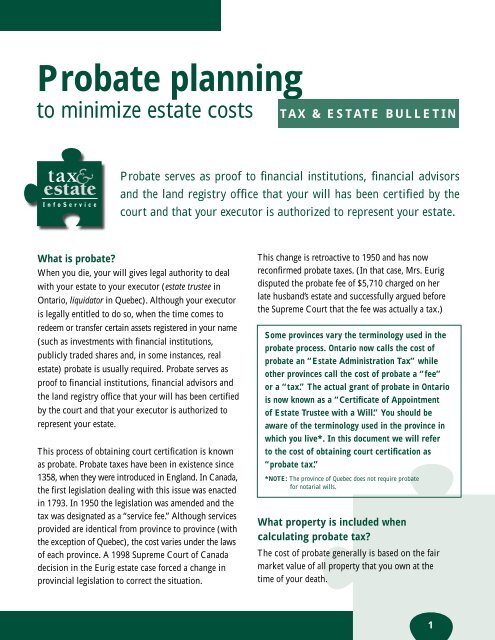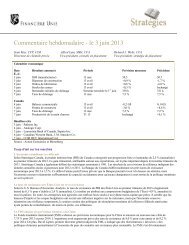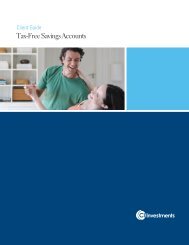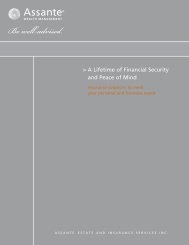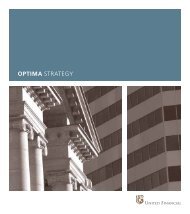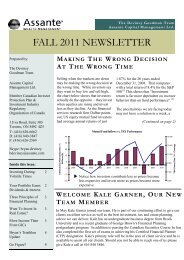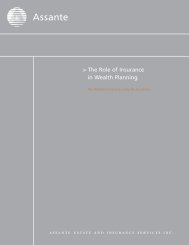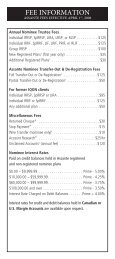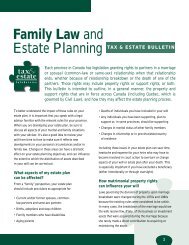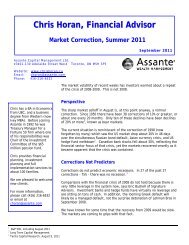Probate planning - Assante Wealth Management
Probate planning - Assante Wealth Management
Probate planning - Assante Wealth Management
Create successful ePaper yourself
Turn your PDF publications into a flip-book with our unique Google optimized e-Paper software.
<strong>Probate</strong> <strong>planning</strong><br />
to minimize estate costs TAX & ESTATE BULLETIN<br />
<strong>Probate</strong> serves as proof to financial institutions, financial advisors<br />
and the land registry office that your will has been certified by the<br />
court and that your executor is authorized to represent your estate.<br />
What is probate<br />
When you die, your will gives legal authority to deal<br />
with your estate to your executor (estate trustee in<br />
Ontario, liquidator in Quebec). Although your executor<br />
is legally entitled to do so, when the time comes to<br />
redeem or transfer certain assets registered in your name<br />
(such as investments with financial institutions,<br />
publicly traded shares and, in some instances, real<br />
estate) probate is usually required. <strong>Probate</strong> serves as<br />
proof to financial institutions, financial advisors and<br />
the land registry office that your will has been certified<br />
by the court and that your executor is authorized to<br />
represent your estate.<br />
This process of obtaining court certification is known<br />
as probate. <strong>Probate</strong> taxes have been in existence since<br />
1358, when they were introduced in England. In Canada,<br />
the first legislation dealing with this issue was enacted<br />
in 1793. In 1950 the legislation was amended and the<br />
tax was designated as a “service fee.” Although services<br />
provided are identical from province to province (with<br />
the exception of Quebec), the cost varies under the laws<br />
of each province. A 1998 Supreme Court of Canada<br />
decision in the Eurig estate case forced a change in<br />
provincial legislation to correct the situation.<br />
This change is retroactive to 1950 and has now<br />
reconfirmed probate taxes. (In that case, Mrs. Eurig<br />
disputed the probate fee of $5,710 charged on her<br />
late husband’s estate and successfully argued before<br />
the Supreme Court that the fee was actually a tax.)<br />
Some provinces vary the terminology used in the<br />
probate process. Ontario now calls the cost of<br />
probate an “Estate Administration Tax” while<br />
other provinces call the cost of probate a “fee”<br />
or a “tax.” The actual grant of probate in Ontario<br />
is now known as a “Certificate of Appointment<br />
of Estate Trustee with a Will.” You should be<br />
aware of the terminology used in the province in<br />
which you live*. In this document we will refer<br />
to the cost of obtaining court certification as<br />
“probate tax.”<br />
*NOTE: The province of Quebec does not require probate<br />
for notarial wills.<br />
What property is included when<br />
calculating probate tax<br />
The cost of probate generally is based on the fair<br />
market value of all property that you own at the<br />
time of your death.<br />
1
Some assets are excluded from valuation for<br />
probate purposes. These include:<br />
• Assets registered in joint names and which, on the<br />
death of the first person, automatically pass to the<br />
survivor(s) by right of survivorship<br />
• Real estate you own that is located outside<br />
the province of residence<br />
• Life insurance and, in most provinces, RRSP/RRIF<br />
holdings for which you have named a beneficiary<br />
(other than your estate)<br />
Calculating probate taxes<br />
<strong>Probate</strong> tax rates by province (as at May 1, 2000)*<br />
Alberta Under $10,000 $25 fee<br />
$10,000 to $249,999 Progressive to $300<br />
$250,000 and over $400 (maximum)<br />
British Columbia First $10,000 No fee<br />
$10,001 to $25,000 $200<br />
$25,001 to $50,000 0.60%<br />
Over $50,000 1.40%<br />
Saskatchewan All estates 0.70%<br />
Manitoba First $10,000 $50<br />
Over $10,000 $50 + 0.60%<br />
Ontario First $50,000 0.50%<br />
Over $50,000 1.50%<br />
Quebec Notarial wills No fee<br />
Holograph/witnessed<br />
Nominal fee<br />
Nova Scotia* First $10,000 $75<br />
$10,001 to $100,000 Progressive to $700<br />
Over $100,000 $700 + 1.2%<br />
New Brunswick First $5,000 $25<br />
$5,001 to $20,000 Progressive to $100<br />
Over $20,000 0.50%<br />
Northwest Territories First $500 $8<br />
(includes Nunavut) $501 to $1,000 $15<br />
Over $1,000 $15 + 0.30%<br />
Newfoundland All estates $75 + 0.50%<br />
Prince Edward Island First $10,000 $50<br />
$10,001 to $100,000 Progressive to $400<br />
Over $100,000 0.40%<br />
Yukon First $25,000 No fee<br />
Over $25,000 $140<br />
* These rates are quoted for use in estimating probate costs. Actual costs of probate may vary minimally when actual detailed<br />
tiered rates are used.<br />
2
As you can see, the cost of probate varies from<br />
province to province. As an example, if you have<br />
a probatable estate (all holdings are included for<br />
probate) valued at $625,000, your estate would be<br />
charged probate taxes in Prince Edward Island at a<br />
different rate than in Ontario, British Columbia or<br />
Quebec. A comparison of the calculations illustrates<br />
the provincial differences:<br />
Value of estate: $625,000<br />
Ontario British Prince Edward Quebec<br />
Columbia Island (Notarial wills only)<br />
First $ 50,000 $ 250 $ 50,000 $ 300 $100,000 $ 400 $0<br />
Remaining $575,000 $ 8,625 $575,000 $ 8,059 $525,000 $ 2,100 $0<br />
Total $625,000 $ 8,875 $625,000 $8,359 $625,000 $2,500 $0<br />
You can see why reducing probate taxes through the use of various <strong>planning</strong> techniques is an important part of<br />
effective estate <strong>planning</strong>, especially in Ontario and British Columbia.<br />
<strong>Probate</strong> tax <strong>planning</strong><br />
MULTIPLE WILLS<br />
<strong>Probate</strong> taxes are usually calculated on the value<br />
of the gross estate. This means that debts (with the<br />
exception of mortgages or other claims against real<br />
estate) are not deducted when calculating the estate<br />
value. This calculation rule can have a big impact<br />
on estate assets if there are more debts than assets.<br />
For example, if your estate has a gross value of<br />
$500,000 and debt of $300,000, and $100,000 of the<br />
debt consists of a mortgage, probate taxes would be<br />
calculated on $400,000, and not on the $200,000 in<br />
assets. If probate is required for any part of your estate,<br />
the entire estate value must be used to calculate the<br />
cost of probating the will, even if some of the estate<br />
assets do not require probate to effect a change of<br />
ownership (for example, Canada Savings Bonds worth<br />
less than $20,000, or shares in a private company).<br />
The use of multiple wills was validated by the Ontario<br />
court decision in the Granovsky estate case. Under<br />
this practice, a primary will is used to deal with<br />
probatable assets. A secondary will is drawn up to deal<br />
with assets that do not require probate. This method<br />
requires you to draw up two wills limited to specific<br />
property, with an executor named in each. Upon your<br />
death, your executor would submit only the primary<br />
will for probate, and the probate tax calculation would<br />
be based on the assets governed by that specific will.<br />
This strategy makes sense for estates of significant value<br />
(say, $200,000 or more) where the savings in probate<br />
tax would justify the additional time and expense of<br />
dealing with more than one will.<br />
If you are considering using the multiple wills strategy,<br />
make sure you get legal advice. As of late May 2000,<br />
using multiple wills to avoid probate tax has been<br />
validated only by the court in Ontario (in Granovsky),<br />
and was based on Ontario statutes. Each province has<br />
its own statutes that will affect the usefulness of multiple<br />
wills in your situation.<br />
If you are using the multiple wills technique, it is<br />
important to include a clause in each will that<br />
3
specifically describes the nature and date of the will<br />
being replaced (primary or secondary). It is also<br />
critical that your wills are kept up to date because a<br />
change in assets can significantly influence your estate<br />
plan. If you are not sure whether a specific asset is<br />
probatable, it is wise to include that asset in your<br />
primary will. If you include a probatable asset in your<br />
secondary will in error, that will would require probate.<br />
In that instance, it would defeat the objective of multiple<br />
wills, namely saving probate taxes.<br />
For more information on wills, please ask for a copy<br />
of our Tax & Estate Bulletin entitled Structuring an<br />
Effective Will.<br />
EXAMPLE<br />
John Russell owned his own private company, a house valued at $250,000 (no mortgage), a bank account with a balance<br />
of $2,500 and an investment portfolio valued at $360,000. At the time of his death John’s private company shares were<br />
worth $525,000. John was a widower, with no dependents.<br />
Using Ontario rates for probate calculations, probate taxes payable would be:<br />
Single will Primary will Secondary will<br />
House $ 250,000 $ 250,000 –<br />
Bank account $ 2,500 $ 2,500 –<br />
Investments $ 360,000 $ 360,000 –<br />
Private shares $ 525,000 – $ 525,000<br />
Gross estate $ 1,137,500 $ 612,500 $ 525,000<br />
<strong>Probate</strong> calculation<br />
First $50,000 $ 250 $ 250 No probate<br />
$15 per $1,000 on balance $ 16,320 $ 8,445 No probate<br />
Total probate tax payable $ 16,570 $ 8,695 $ 0<br />
In this example, probate costs are reduced by $7,875 when multiple wills are used.<br />
NAMED BENEFICIARIES<br />
The Insurance Act allows for direct payment of<br />
the proceeds of an insurance policy on your life<br />
to a named beneficiary upon your death.<br />
Insurance designations can be made either by<br />
naming a beneficiary on the policy, or in your will.<br />
As long as there is a named beneficiary (who, in<br />
the case of an individual, is still alive at the time<br />
you die), the insurance proceeds are excluded from<br />
4
the value of your estate. In addition to insurance<br />
policies, you can name beneficiaries on registered<br />
pensions, RRSP and RRIF accounts in most<br />
provinces, as allowed by provincial laws.<br />
If you name a beneficiary on an insurance policy,<br />
pension, annuity or seg fund and your intended<br />
beneficiary dies before you do, unless you have named<br />
an alternate beneficiary the value of the designated<br />
asset must be included in your estate. It is then<br />
subject to probate tax. You can name more than one<br />
beneficiary on a plan, in which case the proceeds<br />
would be shared equally among all beneficiaries, or<br />
paid to the beneficiaries who are alive at the time of<br />
your death. Many companies also allow you to name<br />
a first choice of beneficiary called primary and to<br />
also name a beneficiary who will only receive the<br />
proceeds if the primary beneficiary predeceases you.<br />
The beneficiary in this case is called an alternate<br />
or contingent. If you want more control over the<br />
distribution of the proceeds, you can arrange for the<br />
proceeds to be paid into your estate and dealt with<br />
according to instructions in your will. In that case,<br />
the proceeds would be subject to probate tax.<br />
Another option is to set up an insurance trust to<br />
receive life insurance proceeds on behalf of your<br />
beneficiaries. This type of formal trust is most often<br />
created by a declaration in your will, but because<br />
the insurance policy pays directly to the trustee<br />
you named in your will, and he or she immediately<br />
deposits the money into the trust account, the<br />
proceeds are not considered to be part of the estate<br />
for probate tax purposes. If you are considering using<br />
an insurance trust, it is important to discuss the<br />
benefits of this option with your legal advisor.<br />
As you can see, although probate <strong>planning</strong> is important,<br />
there are other factors that you should consider in<br />
conjunction with naming beneficiaries to minimize<br />
or avoid probate tax. These issues include making sure<br />
there is enough cash or easily cashable assets in your<br />
estate to pay income or capital gains taxes. There are<br />
also family law and inheritance issues. The cost of<br />
ignoring general estate <strong>planning</strong> issues may be greater<br />
than the probate taxes saved.<br />
JOINT OWNERSHIP<br />
A commonly used method to avoid probate tax on<br />
death is to hold property as joint tenants with right<br />
of survivorship (not available in Quebec). Jointly<br />
held property passes automatically, by operation of<br />
law, to the surviving joint owner or owners and<br />
therefore does not form part of the estate and is not<br />
subject to probate tax. For more information on this<br />
strategy, including potential tax pitfalls, please see<br />
our Tax & Estate Bulletin entitled Joint Accounts.<br />
REAL ESTATE OUTSIDE THE PROVINCE<br />
Real estate outside your province that is owned by you<br />
at the time of your death is not subject to probate tax<br />
with the rest of your estate assets. However, with the<br />
exception of Quebec, the jurisdiction where the real<br />
estate is located may impose its own probate taxes on<br />
that property. If you have a large estate and live in a<br />
province like Ontario or British Columbia where the<br />
probate tax rates are high, Alberta may seem like the<br />
best place to own property for probate purposes.<br />
5
GIFTING<br />
You may reduce the value of your probatable estate<br />
by making gifts while you are alive. There is no gift<br />
tax payable in Canada although there may be income<br />
tax consequences.<br />
The tax rules state that if you dispose of any property<br />
(by selling it or giving it away) and there are no<br />
proceeds, or the proceeds are less than the fair market<br />
value of the property, you will be deemed to have<br />
received an amount equal to the fair market value of<br />
the disposed property. This means that if you give<br />
away assets, you may have to report a capital gain on<br />
the property. If you are considering gifting property,<br />
talk to your advisor to make sure you understand the<br />
legal and tax implications of this strategy.<br />
Revocable living trusts<br />
(“alter ego” and “joint partner”)<br />
Generally, when assets are transferred to a trust for<br />
estate <strong>planning</strong> purposes, the change in ownership<br />
triggers a taxable deemed disposition. This means that<br />
for tax purposes the assets are treated as if they were<br />
sold by you and then purchased at fair market value<br />
by the trust. As a result, any deemed gain realized<br />
from the transfer becomes taxable to you.<br />
There are many reasons why you might want to<br />
transfer assets to a trust. For example, you may be<br />
able to save on probate taxes on these particular assets<br />
by changing the registered ownership from your own<br />
name. In doing so, the assets are no longer considered<br />
to be part of your estate at the time probate tax is<br />
calculated. Using a formal trust lets you benefit from<br />
the income during your lifetime, but have the assets<br />
distributed to other beneficiaries after your death.<br />
Another benefit of using a trust is that it offers a level of<br />
confidentiality that you cannot achieve through a will.<br />
By law, a will becomes a public document once it is<br />
probated. Regardless of your motivation for setting up<br />
a trust, you should be aware that the transfer of assets to<br />
the trust may trigger an immediate income tax liability<br />
to you if there are significant unrealized gains.<br />
Your assets<br />
Income tax on deemed disposition<br />
of property can be delayed until<br />
your death when the assets are<br />
paid out of the trust to your<br />
beneficiaries. No probate tax<br />
is payable on those assets.<br />
Trust<br />
Your<br />
beneficiaries<br />
6
ALTER EGO TRUST<br />
Under certain circumstances outlined in recent draft<br />
legislation (December 1999), you can set up a trust to<br />
help meet your <strong>planning</strong> objectives while minimizing<br />
the tax implications. The transfer of your assets to an<br />
alter ego trust is one strategy that does not necessarily<br />
trigger a taxable disposition (unless you, as transferor,<br />
make an election to have the disposition take place at<br />
fair market value). Upon your death, the assets in the<br />
trust are deemed disposed of, and the tax payable is<br />
determined at that time. Alter ego trusts must be set<br />
up after 1999 by individuals who are at least age 65.<br />
The terms of the trust must include the restrictions<br />
that you are entitled to receive all of the income from<br />
the trust during your lifetime, and that during your<br />
lifetime no one else is entitled to receive or have the<br />
use of any income or capital of the trust.<br />
JOINT PARTNER TRUST<br />
If you want to transfer all of your assets to a trust<br />
not just for yourself, but also for your spouse, current<br />
tax rules will trigger tax on the transfer of assets.<br />
The recently proposed legislation also introduced<br />
the concept of a tax-free transfer to a joint partner<br />
trust. As with the alter ego trust, there will be no<br />
taxable disposition unless you make an election to<br />
transfer the assets at fair market value and trigger<br />
the disposition. On the death of the survivor of you<br />
or your spouse, the assets in the trust will be deemed<br />
to be disposed of at fair market value, and tax will be<br />
payable at that time from assets within your estate.<br />
The establishment of a joint partner trust requires<br />
that it be set up after 1999 by individuals who are<br />
at least age 65 and that you and your spouse (including<br />
common law and, in 2001, same-sex partner) be<br />
entitled to receive all of the income from the trust<br />
until the survivor of you or your spouse, common<br />
law or same-sex partner dies. Also, during the time<br />
the trust is in effect, no one else is entitled to receive<br />
or have access to any income or capital of the trust.<br />
Once assets have been placed in either an alter ego<br />
or joint spousal trust, those assets no longer form<br />
part of your estate, and therefore will not be subject<br />
to probate tax. If you are considering these kinds of<br />
trusts, it is essential that you obtain legal advice.<br />
Summary<br />
<strong>Probate</strong> <strong>planning</strong> is an important part of estate<br />
<strong>planning</strong>, but it should always be considered in<br />
conjunction with effective tax <strong>planning</strong> and other<br />
general estate <strong>planning</strong> priorities. Talk to your advisor<br />
to make sure your estate plan satisfies all your<br />
financial and personal concerns.<br />
Have a tax or estate <strong>planning</strong> question<br />
Call us at 1.800.874.6275 or<br />
e-mail infoservice@aimfunds.ca<br />
Commissions, trailing commissions, management fees and expenses all may be associated with mutual fund investments.<br />
Mutual funds are not guaranteed, their values change frequently and past performance may not be repeated. Please read the<br />
prospectus before investing. Copies are available from your financial advisor or from AIM Funds <strong>Management</strong> Inc.<br />
7
AIM Funds <strong>Management</strong> Inc.<br />
5140 Yonge Street, Suite 900<br />
Toronto, Ontario M2N 6X7<br />
Telephone:<br />
416.590.9855 or 1.800.874.6275<br />
Facsimile:<br />
416.590.9868 or 1.800.631.7008<br />
infoservice@aimfunds.ca<br />
www.aimfunds.ca<br />
Sales Offices<br />
Calgary<br />
Montreal<br />
Toronto<br />
Vancouver<br />
TBPROPE(09/00)


